Med Surg Practice A Lopez PDF

| Title | Med Surg Practice A Lopez |
|---|---|
| Author | Jessica Lopez |
| Course | Clinical Judgement Appliations |
| Institution | Thomas Jefferson University |
| Pages | 6 |
| File Size | 162.2 KB |
| File Type | |
| Total Downloads | 49 |
| Total Views | 140 |
Summary
ATI...
Description
Individual Performance Profile RN Adult Medical Surgical Online Practice 2019 A Individual Name: JESSICA LOPEZ
Individual Score:
62.2%
Student Number: jcl024
Practice Time:
1 hr 12 min
Institution:
Thomas Jefferson U
Focused Review Quiz Result
Program Type:
BSN
Test Date:
3/6/2021
# of Questions:
90
Individual Performance in the Major Content Areas #
Individual
Items
Score
Management of Care
6
83.3%
Safety and Infection Control
8
75.0%
Health Promotion and Maintenance
4
75.0%
Psychosocial Integrity
3
33.3%
Basic Care and Comfort
8
25.0%
Pharmacological and Parenteral Therapies
16
56.3%
Reduction of Risk Potential
19
57.9%
Physiological Adaptation
26
73.1%
Sub-Scale
Individual Score (% Correct)
Topics To Review Go to your Improve tab to access your Focused Review Experience Management of Care (1 item) Establishing Priorities (1 item) Cholecystitis and Cholelithiasis: Priority Finding for a Client Who Has Acute Cholecystitis(Active Learning Template: System Disorder)
Safety and Infection Control (2 items) Accident/Error/Injury Prevention (1 item) Emergency Nursing Principles and Management: Expected Prescription for a Rattlesnake Bite(Active Learning Template: Basic Concept) Standard Precautions/Transmission-Based Precautions/Surgical Asepsis (1 item) Tuberculosis: Priority Intervention(Active Learning Template: System Disorder)
Health Promotion and Maintenance (1 item) Health Screening (1 item) Neurologic Diagnostic Procedures: Conducting a Procedure Checklist for a CT Scan(Active Learning Template: Diagnostic Procedure)
Psychosocial Integrity (2 items) Coping Mechanisms (1 item) Coping: Assessing for Indications of Role Changes for a Group of Clients(Active Learning Template: Basic Concept) Mental Health Concepts (1 item) Please see page 6 for an explanation of the Scores and Topics to Review sections
Report Created on: 3/7/2021 03:27 PM EST
Page 1 of 6
REP_COMP_3_0_IndividualNonProctored_3_0_V3
Topics To Review Go to your Improve tab to access your Focused Review Experience Polycystic Kidney Disease, Acute Kidney Injury, and Chronic Kidney Disease: Educating a Client About Psychosocial Issues(Active Learning Template: System Disorder)
Basic Care and Comfort (6 items) Elimination (2 items) Pressure Injury, Wounds, and Wound Management: Wound Irrigation for a Pressure Injury(Active Learning Template: Nursing Skill) Urinary Elimination: Teaching a Client to Manage Stress Incontinence(Active Learning Template: System Disorder) Mobility/Immobility (1 item) Mobility and Immobility: Climbing Stairs With Crutches(Active Learning Template: Nursing Skill) Nutrition and Oral Hydration (2 items) Cancer Disorders: Dietary Alterations for Reducing Colorectal Cancer Risk(Active Learning Template: System Disorder) Fluid Imbalances: Hypertonic Dehydration(Active Learning Template: System Disorder) Non-Pharmacological Comfort Interventions (1 item) Complementary, Alternative, and Integrative Therapies: Medication Interaction With Feverfew(Active Learning Template: Medication)
Pharmacological and Parenteral Therapies (7 items) Adverse Effects/Contraindications/Side Effects/Interactions (1 item) Hypertension: Recognizing Adverse Effects of Propranolol(Active Learning Template: Medication) Medication Administration (4 items) Anemias: Teaching About Epoetin Alfa(Active Learning Template: Medication) Diabetes Mellitus: Teaching About Metformin(Active Learning Template: Medication) Endocrine Disorders: Interaction With Levothyroxine(Active Learning Template: Medication) Peptic Ulcer Disease: Client Education About Omeprazole(Active Learning Template: Medication) Total Parenteral Nutrition (TPN) (1 item) Gastrointestinal Therapeutic Procedures: Administering Total Parenteral Nutrition (Active Learning Template: Therapeutic Procedure) Parenteral/Intravenous Therapies (1 item) Medications Affecting Coagulation: Nursing Actions for Enoxaparin Administration(Active Learning Template: Medication)
Reduction of Risk Potential (8 items) Laboratory Values (1 item) Complications of Diabetes Mellitus: Expected Findings of Diabetic Ketoacidosis(Active Learning Template: System Disorder) System Specific Assessments (4 items) Noninflammatory Bowel Disorders: Assessing a Client for Inguinal Hernia(Active Learning Template: System Disorder) Pressure Ulcers, Wounds, and Wound Management: Factors for Delayed Wound Healing(Active Learning Template: System Disorder) Stroke: Assessing for Neurologic Deficits(Active Learning Template: System Disorder) Valvular Heart Disease: Priority Assessment Following a Myocardial Infarction(Active Learning Template: Nursing Skill) Therapeutic Procedures (3 items) Burns: Discharge Teaching for Wound Management(Active Learning Template: System Disorder) Growth Factors: Evaluating Understanding of Erythropoietin(Active Learning Template: Medication) Renal Calculi : Expected Findings Following Lithotripsy(Active Learning Template: Therapeutic Procedure)
Physiological Adaptation (7 items) Fluid and Electrolyte Imbalances (1 item) Electrolyte Imbalances: Expected Findings Based on Potassium Level(Active Learning Template: Basic Concept) Medical Emergencies (2 items) Head Injury: Identifying Indications of Cushing's Triad(Active Learning Template: System Disorder) Please see page 6 for an explanation of the Scores and Topics to Review sections
Report Created on: 3/7/2021 03:27 PM EST
Page 2 of 6
REP_COMP_3_0_IndividualNonProctored_3_0_V3
Topics To Review Go to your Improve tab to access your Focused Review Experience Pressure Injury, Wounds, and Wound Management: Priority Action for Management of Evisceration(Active Learning Template: System Disorder) Pathophysiology (2 items) Hyperthyroidism: Manifestations of Thyroid Storm(Active Learning Template: System Disorder) Hyperthyroidism: Dietary Teaching Following Thyroidectomy With Parathyroid Removal(Active Learning Template: Therapeutic Procedure) Illness Management (2 items) Hyperthyroidism: Assessing a Client for Thyroid Storm(Active Learning Template: System Disorder) Inflammatory Bowel Disease: Managing Irritable Bowel Syndrome(Active Learning Template: System Disorder)
Outcomes
Nursing Process
No of Items
Individual Score
Description
RN Assessment
18
50.0%
The assessment step of the nursing process involves application of nursing knowledge to the collection, organization, validation and documentation of data about a client ’s health status. The nurse focuses on the client ’s response to a specific health problem including the client ’s health beliefs and practices. The nurse thinks critically to perform a comprehensive assessment of subjective and objective information. Nurses must have excellent communication and assessment skills in order to plan client care.
RN Analysis/Diagnosis
15
46.7%
The analysis step of the nursing process involves the nurse’s ability to analyze assessment data to identify health problems/risks and a client’s needs for health intervention. The nurse identifies patterns or trends, compares the data with expected standards or reference ranges and draws conclusions to direct nursing care. The nurse then frames nursing diagnoses in order to direct client care.
RN Planning
12
83.3%
The planning step of the nursing process involves the nurse’s ability to make decisions and problem solve. The nurse uses a client ’s assessment data and nursing diagnoses to develop measureable client goals/outcomes and identify nursing interventions. The nurse uses evidenced based practice to set client goals, establish priorities of care, and identify nursing interventions to assist the client to achieve his goals.
RN Implementation/Therapeutic Nursing Intervention
35
71.4%
The implementation step of the nursing process involves the nurse’s ability to apply nursing knowledge to implement interventions to assist a client to promote, maintain, or restore his health. The nurse uses problem-solving skills, clinical judgment, and critical thinking when using interpersonal and technical skills to provide client care. During this step the nurse will also delegate and supervise care and document the care and the client ’s response.
RN Evaluation
10
50.0%
The evaluation step of the nursing process involves the nurse’s ability to evaluate a client ’s response to nursing interventions and to reach a nursing judgment regarding the extent to which the client has met the goals and outcomes. During this step the nurse will also assess client/staff understanding of instruction, the effectiveness of interventions, and identify the need for further intervention or the need to alter the plan.
Please see page 6 for an explanation of the Scores and Topics to Review sections
Report Created on: 3/7/2021 03:27 PM EST
Page 3 of 6
REP_COMP_3_0_IndividualNonProctored_3_0_V3
Priority Setting
No of Items 15
Thinking Skills
No of Items
Individual Score 60.0%
Individual Score
Description Ability to demonstrate nursing judgment in making decisions about priority responses to a client problem. Also includes establishing priorities regarding the sequence of care to be provided to multiple clients.
Description
Foundational Thinking in Nursing
14
71.4%
Ability to recall and comprehend information and concepts foundational to quality nursing practice.
Clinical Judgment/Critical Thinking in Nursing
76
60.5%
Ability to use critical thinking skills (interpretation, analysis, evaluation, inference, and explanation) to make a clinical judgment regarding a posed clinical problem. Includes cognitive abilities of application and analysis.
No of Items
Individual Score
RN Management of Care
6
83.3%
The nurse coordinates, supervises and/or collaborates with members of the health care to provide an environment that is costeffective and safe for clients.
RN Safety and Infection Control
8
75.0%
The nurse uses preventive safety measures to promote the health and well-being of clients, significant others, and members of the health care team.
RN Health Promotion and Maintenance
4
75.0%
The nurse directs nursing care to promote prevention and detection of illness and support optimal health.
RN Psychosocial Integrity
3
33.3%
The nurse directs nursing care to promote and support the emotional, mental and social well-being of clients and significant others.
RN Basic Care and Comfort
8
25.0%
The nurse provides nursing care to promote comfort and assist client to perform activities of daily living.
RN Pharmacological and Parenteral Therapies
16
56.3%
The nurse administers, monitors and evaluates pharmacological and parenteral therapy.
RN Reduction of Risk Potential
19
57.9%
The nurse directs nursing care to decrease clients’ risk of developing complications from existing health disorders, treatments or procedures.
RN Physiological Adaptation
26
73.1%
The nurse manages and provides nursing care for clients with an acute, chronic or life threatening illness.
NCLEX®
QSEN
No of Items
Individual Score
Description
Description
Safety
32
59.4%
The minimization of risk factors that could cause injury or harm while promoting quality care and maintaining a secure environment for clients, self, and others.
Patient-Centered Care
22
63.6%
The provision of caring and compassionate, culturally sensitive care that is based on a patient ’s physiological, psychological, sociological, spiritual, and cultural needs, preferences, and values.
Evidence Based Practice
35
62.9%
The use of current knowledge from research and other credible sources to make clinical judgments and provide client-centered care.
Teamwork and Collaboration
1
100.0%
The delivery of client care in partnership with multidisciplinary members of the health care team, to achieve continuity of care and positive client outcomes.
Please see page 6 for an explanation of the Scores and Topics to Review sections
Report Created on: 3/7/2021 03:27 PM EST
Page 4 of 6
REP_COMP_3_0_IndividualNonProctored_3_0_V3
No of Items
Individual Score
Human Flourishing
5
80.0%
Human flourishing is reflected in patient care that demonstrates respect for diversity, approaches patients in a holistic and patientcentered manner, and uses advocacy to enhance their health and well-being.
Nursing Judgment
58
62.1%
Nursing judgment involves the use of critical thinking and decision making skills when making clinical judgments that promote safe, quality patient care.
Professional Identity
1
100.0%
Professional identity reflects the professional development of the nurse as a member and leader of the health care team who promotes relationship-centered care, and whose practice reflects integrity and caring while following ethical and legal guidelines.
Spirit of Inquiry
26
57.7%
A spirit of inquiry is exhibited by nurses who provide evidence based clinical nursing practice and use evidence to promote change and excellence.
NLN Competency
Description
No of Items
Individual Score
Liberal Education for Baccalaureate Generalist Nursing Practice
5
60.0%
The need for an education that exposes nurses to multiple fields of study providing the foundation for a global perspective of society as well as high level thinking and acquisition of skills that can be applied to complex patient and system-based problems.
Basic Organization and Systems Leadership for Quality Care and Patient Safety
6
66.7%
The need for nurses to be able to understand power relationships and use decision-making and leadership skills to promote safe practice and quality improvement within health care systems.
Scholarship for Evidence-Based Practice
33
60.6%
The need for nurses to be able to understand the research process and base practice and clinical judgments upon fact-based evidence to enhance patient outcomes.
Interprofessional Communication and Collaboration
1
100.0%
The need for nurses to be able to function as a member of the healthcare team while promoting an environment that supports interprofessional communication and collaboration with the goal of providing patient-centered care.
Clinical Prevention and Population Health
30
63.3%
The need for nurses to be able to identify health related risk factors and facilitate behaviors that support health promotion, and disease and injury prevention, while providing population-focused care that is based on principles of epidemiology and promotes social justice.
Baccalaureate Generalist Nursing Practice
15
60.0%
The need for nurses to be able to practice as a generalist using clinical reasoning to provide care to patients across the lifespan and healthcare continuum and to individuals, families, groups, communities, and populations.
BSN Essentials
Please see page 6 for an explanation of the Scores and Topics to Review sections
Report Created on: 3/7/2021 03:27 PM EST
Description
Page 5 of 6
REP_COMP_3_0_IndividualNonProctored_3_0_V3
Score Explanation and Interpretation Individual Performance Profile
INDIVIDUAL SCORE
TOPICS TO REVIEW
The individual score is the number of questions answered correctly divided by the number of questions on the assessment. It is on a scale of 0% to 100%.
Based on the questions missed on this assessment, a listing of content areas and topics to review is provided. A variety of learning resources may be used in the review process, including content, images, animations, and videos in ATI’s Content Mastery Series® Review Modules, online practice assessments, and a focused review that is individualized to the questions missed.
Exp_Ind_Non_Proctored tit ti
©A
tT h
l
i
I tit t
®
I...
Similar Free PDFs

Med Surg Practice A Lopez
- 6 Pages

ATI - Med-Surg Practice A
- 5 Pages
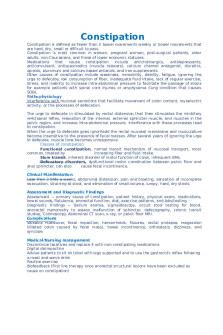
Med Surg GI practice questions
- 23 Pages

Final Exam Practice Qs - Med Surg
- 19 Pages

Exam 2 Med Surg 2 Practice Questions
- 16 Pages
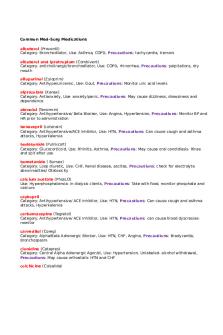
Common Med Surg Meds
- 7 Pages

Med surg dorris bowman
- 4 Pages
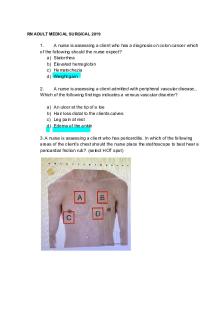
Med surg - notes
- 28 Pages
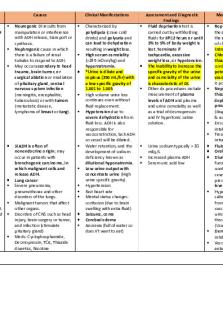
Med-Surg Endocrine
- 11 Pages
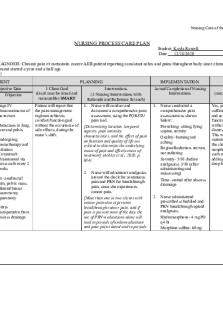
Med Surg- Care Plan
- 6 Pages
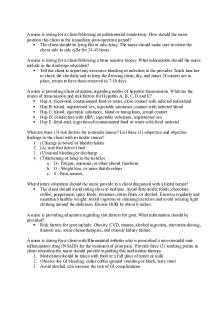
Med-Surg Capstone remediation
- 4 Pages

Med Surg Exam 3
- 19 Pages
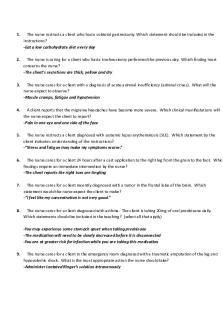
Kaplan med surg 2
- 8 Pages
Popular Institutions
- Tinajero National High School - Annex
- Politeknik Caltex Riau
- Yokohama City University
- SGT University
- University of Al-Qadisiyah
- Divine Word College of Vigan
- Techniek College Rotterdam
- Universidade de Santiago
- Universiti Teknologi MARA Cawangan Johor Kampus Pasir Gudang
- Poltekkes Kemenkes Yogyakarta
- Baguio City National High School
- Colegio san marcos
- preparatoria uno
- Centro de Bachillerato Tecnológico Industrial y de Servicios No. 107
- Dalian Maritime University
- Quang Trung Secondary School
- Colegio Tecnológico en Informática
- Corporación Regional de Educación Superior
- Grupo CEDVA
- Dar Al Uloom University
- Centro de Estudios Preuniversitarios de la Universidad Nacional de Ingeniería
- 上智大学
- Aakash International School, Nuna Majara
- San Felipe Neri Catholic School
- Kang Chiao International School - New Taipei City
- Misamis Occidental National High School
- Institución Educativa Escuela Normal Juan Ladrilleros
- Kolehiyo ng Pantukan
- Batanes State College
- Instituto Continental
- Sekolah Menengah Kejuruan Kesehatan Kaltara (Tarakan)
- Colegio de La Inmaculada Concepcion - Cebu


